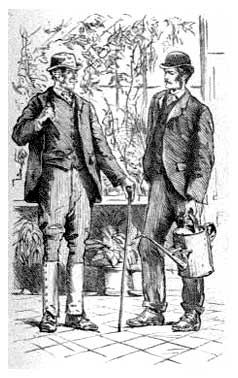Chapter 5 | A Life's Eclipse
“I am very deeply grieved, Mr Manning,” said Mrs Mostyn, as she sat in her drawing-room, holding a kind of consultation with the doctor and James Ellis, her old agent, and as she spoke, the truth of her words was very evident, for she kept applying her handkerchief to her eyes. “I liked John Grange. A frank, manly fellow, whose heart was in his work, and I fully intended, Ellis, that he should succeed poor old Dunton.”
“Yes, ma’am; a most worthy young man,” said the bailiff.
“Worthy? He was more than that. He was fond of his work and proud of the garden. Go in that conservatory, doctor, and look at my orchids. His skill was beyond question.”
“Your flowers are the envy of the county, Mrs Mostyn,” said the doctor.
“Ah, well! It is not my flowers in question, but this poor fellow’s future. Do you mean to tell me that you can do nothing for him?”
“I regret to say that I must,” said the doctor gravely. “We try all we can to master Nature’s mechanism, but I frankly confess that we are often very helpless. In this case the terrible shock of the fall on the head seems to have paralysed certain optical nerves. Time may work wonders, but I fear that his sight is permanently destroyed.”
“Oh, dear, dear, dear!” sighed Mrs Mostyn, down whose pleasant old face the tears now coursed unchecked; “and all to satisfy my whims—all because I objected to a ragged, broken branch. But, doctor, can nothing be done?”
“I can only recommend one thing, madam—that he should go up to one of the specialists, who will suggest that he should stay in his private infirmary.”
“Well, why not?” said Mrs Mostyn eagerly.
“There is the expense, madam,” said the doctor hesitatingly.
“Expense? Pooh! Fudge! People say I am very mean. Poor old Dunton used to say so, and James Ellis here.”
“I beg your pardon, ma’am—” began the bailiff.
“Oh, don’t deny it, James; you know you have. I heard of it over and over again, because I would not agree to some extravagant folly proposed by you or poor old Dunton for the estate or garden.”
“But—”
“Silence! I remember Dunton said I could spend hundreds on new orchids, and stinted him in help; and you were quite angry because I wouldn’t have half-a-mile of new park palings, when the old mossy ones look lovely. But I’m not mean, doctor, when there is a proper need for outlay. Now you go at once and make arrangements for that poor young man to be taken up to town and placed in this institution. Mind, you are to spare no expense. It was my fault that poor Grange lost his sight, and I shall never love my garden again if his eyes are not restored.”
The doctor rose, shook hands, and went away, leaving the bailiff with his mistress, who turned to him with her brow all in puckers.
“Well, James Ellis, I hardly know what to say. It is a dreadful shock, and I don’t like to do anything hastily. If there was a prospect of poor Grange recovering I would wait.”
The bailiff shook his head.
“Doctor Manning told me, ma’am, that he was afraid it was hopeless.”
“And I’m afraid so too,” said Mrs Mostyn, with a sigh.
“I can’t superintend the garden myself, ma’am.”
“No, Ellis, you have too much to do.”
“And gardens are gardens, ma’am—ours in particular.”
“Yes,” said Mrs Mostyn, who was thinking of the poor fellow lying at the bothy in darkness.
“And with all those glass-houses and their valuable contents, a day’s neglect is never recovered.”
“No, James Ellis.”
“The men, too, want some one over them whom they must obey.”
“Of course—of course, Ellis. And you think Daniel Barnett is quite equal to the duties?”
“Oh, yes, ma’am. He is quite as good a gardener as John Grange, so I don’t think you could do better, ma’am. You see we know him, that he is trustworthy and clever.”
“Well, well, I’ll think about it. I will not decide this morning; but I suppose it will have to be so. I can’t go appointing another man directly the breath is out of poor old Dunton’s body, and with that poor fellow lying there in misery. Come to me this day week, James Ellis, and I will give my decision.”

The bailiff bowed and withdrew, to go straight to the gardens, where, quite by accident, of course, Daniel Barnett came along one of the paths, and met him, looking at him inquiringly; but Ellis did not say a word about the subject nearest then to the young man’s heart. He asked how the grapes were looking, and had a peep at them and the melons. Then went on through the orchid-houses, reeking with heat and moisture, and at last stood still wiping his head in the hot sunshine.
“They do you credit, Barnett,” he said. “I’m very glad to see how you have thrown yourself into the gap, and managed now poor John Grange is down; everything looks perfect. I see you have kept the men up to their work.”
“Done my best, Mr Ellis, of course,” said the young man.
“Of course, of course. I told Mrs Mostyn I was sure you would. There, I must be off. Good-morning.”
He started off for the gate, and then turned.
“Oh, by the way, Barnett, poor John Grange is to be sent up to town. I thought you would like to hear. But don’t say a word to him, and—er—I’m always at home of an evening if you care to step up and have a quiet pipe with me, and a bit of music before supper. Good-morning.”
“The wind’s changed,” said Dan Barnett, with his face flushed up by the exultation he felt. “I’m safe two ways. Poor old Jack Grange! Well, we can’t all win.”

